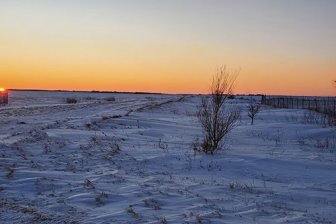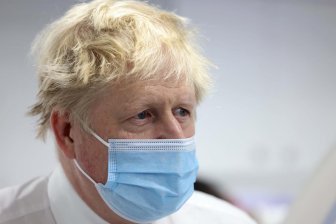Ukrainian Canadians worry about Russia conflict: ‘I’m afraid for my family’ – National
As fears of a potential Russian military invasion in Ukraine grows, Anastasiya Khoma worries for her loved ones back home.
“I’m afraid for my family because there is nowhere they can go and there’s nothing much they can do to protect themselves,” the 27-year-old Edmonton resident told Global News.
“They cannot escape to either Europe or come to Canada, so they’re kind of trapped in a situation where they are.”
Many Ukrainians in Canada are growing uneasy with the ongoing crisis involving the two neighbouring nations, which has heated up this week as Russian troops amass near the border.
Read more:
Russian hackers targeting critical infrastructure in Canada, agency says
“This new escalation with this new military build-up, it worries me because … you don’t know what to expect,” said 41-year-old Winnipeg resident Dmytro Malyk, whose parents live in Ukraine.
Story continues below advertisement
“They’re very anxious (and) they’re very worried about what might happen.”
For weeks, tension has been building between Ukraine and Russia, stoking fears of an armed conflict between the two countries.
Russia has positioned about 100,000 troops across Ukraine’s borders, along with tanks and other heavy artillery. Russia has denied it intends to launch an invasion in the former Soviet state.
Read more:
Massive cyberattack hits Ukraine government websites amid tensions with Russia
Russian President Vladimir Putin has claimed the increased military presence is in response to provocations from the West.
On Wednesday, United States President Joe Biden said he expects Putin to invade Ukraine, but that Russia would pay a “dear price” in lives lost and a possible cut-off from the global banking system if it does.
Canada, the U.S. and other NATO allies have urged Russia to reach a diplomatic solution, but a number of Russia’s demands – including banning Ukraine from joining NATO – are seen as non-starters.
Anastasiya Khoma poses for a photo in front of the Lviv National Opera theatre in Lviv, Ukraine in 2019. Khoma worries for her family in Ukraine as tensions with Russia continue to escalate.
Anastasiya Khoma/photo
Foreign Affairs Minister Melanie Joly said Thursday Canada will join allies in imposing severe sanctions on Russian officials if the country takes further military action to compromise Ukrainian sovereignty.
Story continues below advertisement
Joly said Russia is already in Ukraine, referencing Russia’s 2014 annexation of Crimea and its instigating of Russian separatist forces in Ukraine’s eastern region.
“The recently launched diplomatic process offers Russia two options: they can choose meaningful dialogue, or severe consequences,” Joly said.

Russia faces severe sanctions if it advances further into Ukraine: Joly
Ukraine has requested military equipment like weapons from Canada, but Joly had nothing new to say about whether Ottawa would answer those requests. She added Prime Minister Justin Trudeau is looking at “a range of options” that are based on information she has been gathering during her European trip this week.
Trending Stories
-

Man charged after four people found dead near Canada-U.S. border in Manitoba -

U.K. drops COVID-19 restrictions as Boris Johnson says Omicron has peaked
“One of the things that we have seen is that Russia is looking for excuses or reasons to continue and even escalate its aggression against Ukraine,” Trudeau said on Wednesday.
Read more:
Trudeau says Russia looking for ‘excuses’ to invade Ukraine
Story continues below advertisement
“We’re looking at many different factors when we make decisions on how to best support the people of Ukraine. The bottom line is we will be there to continue supporting the people of Ukraine through multiple levels and layers of support.”
Dmytro Malyk poses for a photo in Winnipeg, Man. in 2018. Current Russian aggression against Ukraine is worrying Malyk.
Courtesy Dmytro Malyk
Many Ukrainians in Canada want to help Ukraine, said Ihor Michalchyshyn, executive director and CEO of the Ukrainian Canadian Congress.
One of the measures he would like to see the federal government take is fulfilling Ukraine’s request for weapons. The United States and the United Kingdom have sent weapons and other military equipment to the region recently.

Edmonton’s vast Ukrainian community stands in solidarity with Ukraine as conflict with Russia escalates
Canada, meantime, has sent a small group of special force operators to Ukraine to advise the government in Kyiv and help plan an evacuation of Canadian diplomatic staff in the event of an invasion.
Story continues below advertisement
It has also committed roughly $700 million in support of the Ukrainian government since 2014, and for years has sent rotations of 200 Canadian Armed Forces members to help train Ukrainian security forces under Operation UNIFIER.
“This is the time when we need Canada to step up as a leading friend and ally of Ukraine, and we believe there is widespread support in Canada from all Canadians … for additional supports to Ukraine because people understand this is a security issue,” Michalchyshyn said.
“This is about Russia as an authoritarian country deciding which borders it respects and doesn’t respect in Western Europe. Canada borders Russia (in the north and) it is not unforeseen that this would impact Canadian security.”

Canada, allies unite in support of Ukraine to put pressure on Russia
As for Khoma, she hopes Canada can help insist Ukraine becomes a part of NATO, while Malyk wants to see further sanctions levelled against Russia now.
Story continues below advertisement
Most of all, both hope war does not break out.
“By the time Western countries act, it’s already too late with regards to Russia,” Malyk said.
“If there is a way to de-escalate this possible war with pre-emptive sanctions right now, that would be great.”
— with files from Alex Boutilier and The Canadian Press
© 2022 Global News, a division of Corus Entertainment Inc.
Source link : CNN
Leave a Reply Cancel reply
RECOMMENDED NEWS
BROWSE BY CATEGORIES
BROWSE BY TOPICS
POPULAR NEWS
2021 © All rights Reserved ChrisAnu











